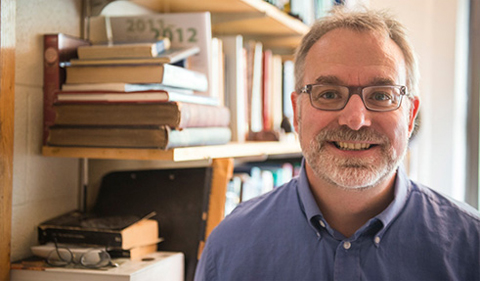
Dr. David Drabold, Distinguished Professor
By Jenna Guyot
NQPI editorial intern
Ohio University Physics & Astronomy professor and Nanoscale & Quantum Phenomena Institute member David Drabold collaborated with professors Parthapratim Biswas and Raymond Atta-Fynn, from the University of Southern Mississippi and University of Texas, Arlington, respectively, through an NSF-funded grant to develop a new approach to modeling materials.
“The three of us put this proposal together and submitted it,” Drabold stated. “It’s for $520,000, and it was funded a few months ago.”
The proposal was titled “Joint Utilization of Experimental and Theoretical Information: A New Paradigm for Modeling Complex Materials.” The challenge of the proposal was to formulate effective ways to design computer models of materials with preferred characteristics (to enable computer design and engineering of materials), and it outlined one of the first successful attempts to meet this challenge.
Drabold’s student Kiran Prasai, along with Biswas and Drabold, recently published an article, “Sculpting the Band Gap: a Computational Approach,” in which they introduced a way to design materials with a desired electronic structure. This work was a helpful illustration of the approach that was useful in convincing the NSF of the significance of the proposed work.
Outreach is an important part of the award. “We intend to do some outreach, especially in the University of Southern Mississippi. There is significant poverty there, and an underserved and underrepresented population. Previous experience has shown that a program to involve local people in the university and physics in particular can open doors for underserved populations and obtain some promising new students. We’re also going to look into starting a program similar to our HTC¹ program at the University of Southern Mississippi, probably in their physics department,” Drabold said.
He is optimistic about his plans for developing the research while he and his colleagues plan to work on the outreach.
“All of this work is exciting, and it is the kind of stuff that makes the job worthwhile.”
¹The Honors Tutorial College at Ohio University incorporates all the essential features of the traditional British college tutorial system of undergraduate education developed at Oxford and Cambridge Universities. Students in HTC interact very closely with faculty; a large fraction of their class time is spent in individual meetings with faculty members.



















Comments